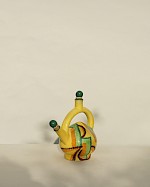Eva Zeisel (1906–2011) was a Hungarian-born designer known for her influential work in ceramics, furniture, and other design fields. Over a career spanning more than 75 years, she became one of the most important industrial designers of the 20th century, creating beautiful and functional objects that enhanced everyday life.
Born in Budapest, Zeisel grew up in an intellectually rich, progressive household. Her mother, Laura Polanyi Striker, was the first woman to earn a doctorate in history from the University of Budapest. This environment shaped Zeisel’s creative outlook and design philosophy. Initially studying painting at the Budapest Royal Academy of Fine Arts, she eventually turned to ceramics, apprenticing under local potter Jakob Karapancsik. In 1925, she opened her own pottery studio, creating “black pottery” through a traditional Hungarian firing technique. Influenced by the Wiener Werkstätte and the German Werkbund, Zeisel embraced the idea of merging art and industry.
In the 1930s, Zeisel moved to Russia, where she became the artistic director of the state-run china and glass industry. Her time in Russia was marked by political turmoil, and after being falsely accused of plotting against Stalin, she spent 16 months in prison. Upon release, she emigrated to the United States with her husband, where she became a prominent designer. One of her most notable works was her collaboration with Hall China Company, designing the “Tomorrow’s Classic” dinnerware, which became widely successful.
Zeisel’s designs were characterized by flowing, organic forms inspired by nature and the human body. She sought to create high-quality, affordable designs that could be mass-produced. Throughout her career, her work was featured in major museum collections, including MoMA and the Metropolitan Museum of Art. Zeisel continued designing until her death at 105, leaving a lasting legacy in the world of design.

